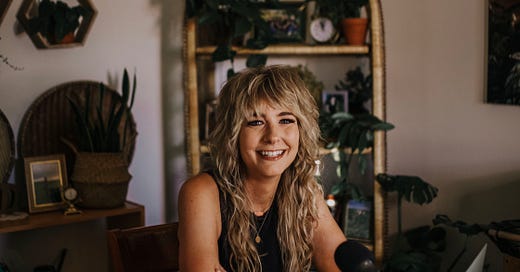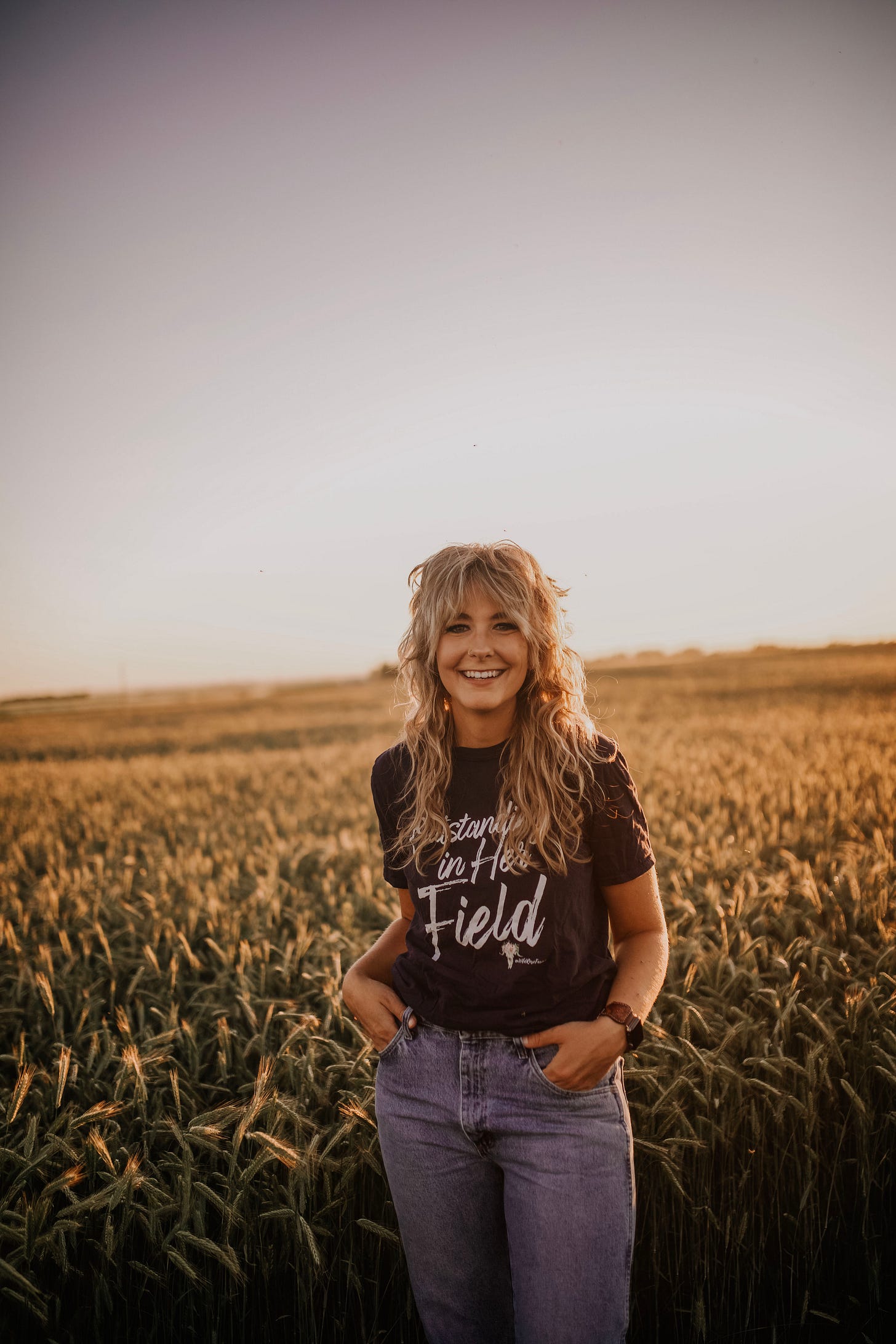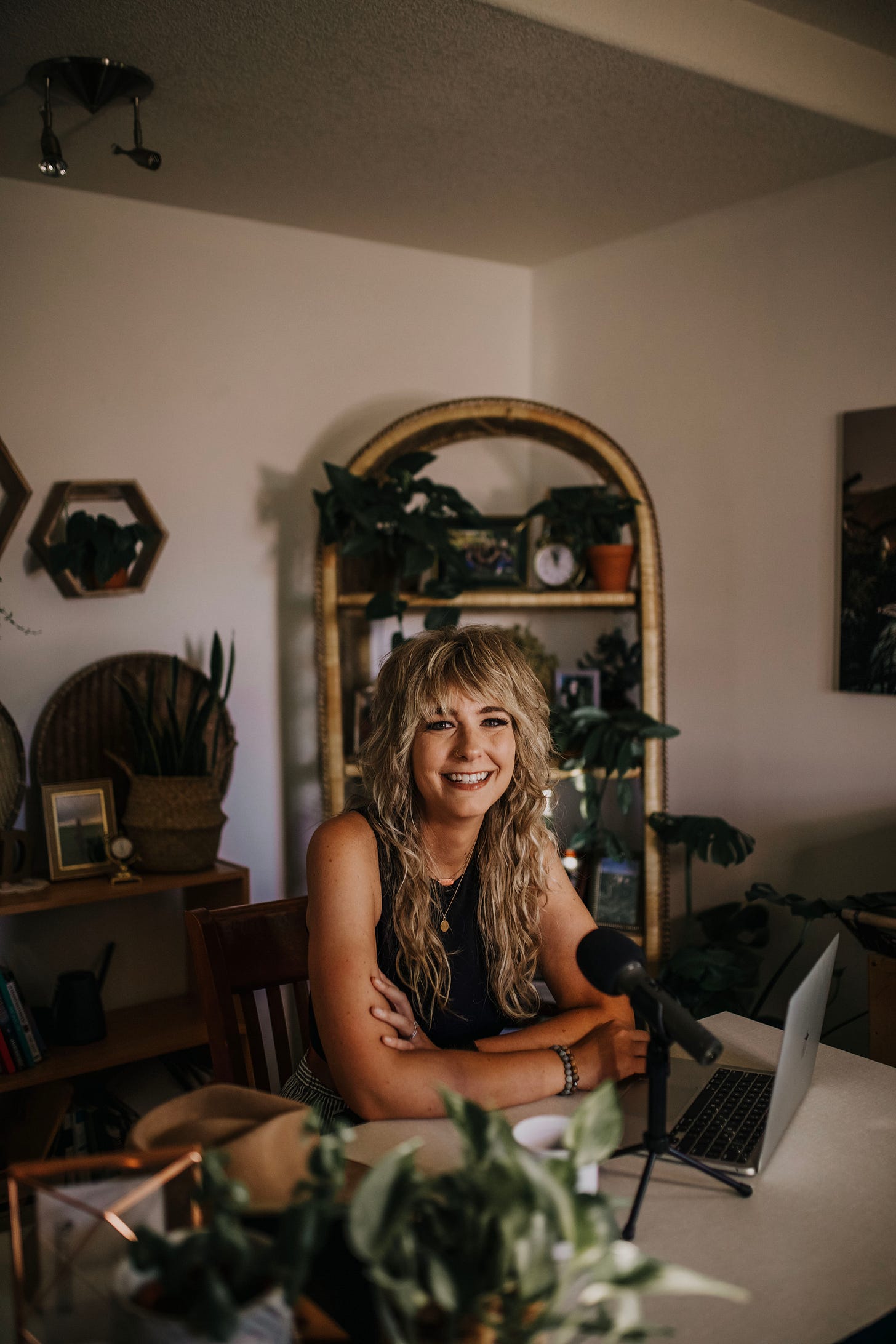Rural Women Cultivating a Life They Love: An Interview with Katelyn Duban
"We all have a story to share and we get to choose what that looks like for us."
Last month, I traded a dozen of my farm fresh eggs for sourdough starter from a friend. I joked with my husband, “I’m bartering like the homesteaders did!”
I read Little House on the Prairie for the first time in elementary school, and since then, I’ve loved reading about life on homesteads around the turn of the 20th century. In January, I re-read Hattie Big Sky, a juvenile fiction book based on a real woman from Montana. And I’m working my way through a non-fiction book about women homesteaders in Montana in the early 1900s.
I can’t imagine what these women’s lives were like that made them pack up and move to the middle of nowhere in Montana to stake a claim of 160 acres. Many of them alone. Were they scared?
Or maybe, they were excited at the chance to start fresh. They didn’t have time to think about their fears before jumping in; they just did it. Later, I imagine, their fears set in, and they worried for their safety or their ability to survive. Would their crops make it? Would they have enough food to live? Would they be able to “prove up” on their claim—their ultimate goal?
Besides trying to survive, I can’t help but wonder, how did they make friends? How did they find other women to barter or trade their goods with? There were no phones, texts, or social media. Were they lonely?
In college, I studied journalism, and I love hearing people’s stories and asking questions. Over the years, I’ve shared some of my stories on the good and hard of rural life. And now, I want to share some stories from other rural women. Women who inspire me in their daily lives. Women whose lives are similar to mine. Women whose lives are different than mine.
I was inspired by Ashlee Gadd’s interview series with creative women on her Substack,
. Today, I’m introducing my own interview series—Rural Women Cultivating a Life They Love.My first interview is with Katelyn Duban. We met through Instagram several years ago, and we recently met in person for the first time (!!) last fall. I wasn’t nearly as awkward as I thought I would be, and she still talks to me today!
I thought Katelyn would be a fantastic first person to interview because she is such a great supporter of all women in agriculture and embraces the rural lifestyle. She is a farmer, the host and founder of The Rural Woman Podcast, and a cat wrangler outside of Lethbridge, Alberta. Here’s my interview with her.
Katelyn, we met on Instagram a few years ago. Specifically, I found you on Instagram and made you my friend. I was drawn to your “Rural Woman” title because I feel it encompasses all of us—farmers, ranchers, homesteaders, or someone who lives rurally, although maybe not on a farm or ranch. Rural can mean a lot of different things to different people. What does rural mean to you?
Rural to me is a feeling rather than a place. I feel connected to the openness, the animals, and the peacefulness that can come from being outside. There is a special slowness even in the busiest of seasons. Rural is home.
Looking back at when I was brainstorming the title of my podcast, I knew I wanted something that was all-encompassing. Coming from the city, marrying a farmer, and transitioning into a certified organic farm were just a few of the titles that I had myself. Knowing that I wanted other women who had similar stories and stories that were the complete opposite of mine to feel like they were welcome here made the title Rural Woman all-encompassing.
I love historical fiction; my love for this genre started with Little House on the Prairie when I was a kid. But when I read historical non-fiction, I truly see the challenges and hardships women (and men) faced. So here’s a hypothetical question—do you think you would have been able to survive on a homestead in the early 1900s?
My initial reaction to that question would be absolutely not. I look at our own farm and hear the stories from Baba (my husband’s paternal grandmother) and what her life looked like here. She had acres of garden, livestock she raised and processed herself, children, and crops to grow. Baba literally did it all.
But when I truly think about it - yes, I would. When I dive deep into my authentic self; I am strong, resilient, and gutsy. There have been times when I have thought this had to truly be my last knockdown but somehow, someway, I manage to get back up. I think the getting backup piece is our most powerful tool for growth. We don’t grow in comfort.
Baba is my inspiration for what women, in any era, can accomplish.
Like me, you didn’t grow up on a farm or a ranch. What do you find the biggest challenge to be in this lifestyle? Has that changed over the years?
Working in seasons is a concept that was so foreign to me until I was physically living on this farm. I grew up in a household where you went to work Monday through Friday, 9-5, got two weeks' vacation, etc.
And here I was in a place where you worked non-stop for 8 months of the year, your home was your work and it literally felt like there was no reprieve. And suddenly things would slow down and you got a minute to breathe. The comedown from the high-intensity season takes a toll on your mental and physical health. And just when you feel like you have space to think and room to roam- you get to start again.
There is a lack of control that we have over our lives. Learning to let go and be intentional with the seasonality has gotten me through.
I now crave the seasons and all the challenges and beauty they bring.
You live in Alberta, while I live in Montana. We are neighbors, though in different countries. If we lived one hundred years ago, it’s not likely we would have met—which is one of the great things about social media. But, on the other hand, I think most of us can agree that social media has its challenges too. How do you find that balance of using it as a means of connection without letting it run your life?
My relationship with social media has been a rollercoaster. I started sharing my story in early 2017, soon after we got married, as a way to document my new life on the farm and as a way to connect with other women who lived similarly. I didn’t know farmers, I wasn’t connected to farmers, and I wanted to know what the hell I was supposed to be doing out here.
I quickly found women who were doing all sorts of amazing things in their operations, from growing crops, raising kids and livestock, running their businesses behind the scenes, etc. I loved that though our operations could look completely different, we could relate to each other and empathize and celebrate together. These were all the positives for me, and they still are, but for a time in my online life, it wasn’t like this.
For a time, I was involved in a toxic online relationship with a group of women in agriculture. When it started - we seemed to have a similar purpose and goal, but it quickly turned into a dark mean-girl-like space that made social media not a fun place to be for myself and those outside the ‘group’ who wanted to cultivate the ‘genuine’ relationships that were portrayed.
Knowing what I know about what can go on behind the scenes, I have truly learned what is meant by social media being the highlight reel.
Social media, for me, is a few things; a business, my personal brand, and a community. Acknowledging those three pillars and setting my own boundaries within those pillars has truly changed my relationship with social media for the good. I no longer feel the need to show up when I don’t have the energy or capacity. Does this hinder my growth potential? Yes. Is that a metric that means the most in those pillars I’ve identified? Nope.
Social media is optional. We get to choose when and how we show up. Taking breaks or writing it off completely is okay. We all have a story to share, and we get to choose what that looks like for us.
Rural life (and life in agriculture) can make finding friends challenging. People outside of agriculture sometimes don’t understand why you can’t commit to something in the future, for example, but it might depend on the weather if you can go! How have you made friends over the years? How do you maintain them?
To be honest, this has been a hard one for me at times. I lived my whole life 25 minutes away from the front door of our farm. I have friends whom I stood up for on their wedding day that have never stepped foot on the farm. I live ‘too far away’ for them to stop by. The list of reasons why I haven’t seen someone can be a long and exhausting one. And to be fair - this list definitely goes both ways.
Relationships are complicated and tricky. Throw in marriages, illness, children, divorce, etc. into the mix, and you have yourself life in 2023.
I think it’s really easy to fall into the victim narrative when it comes to friendships off of the farm. Our schedules don’t align with the typical suburban narrative. I think it really takes openness and vulnerability to maintain and keep those relationships. Asking your friends to come out and be a part of what you’re doing in your operation is one of the best things I have ever done. Some of my favourite memories are of my friends who come out for coffee, bring their hoards of kids and squish in the tractor with me.
Online friendships, which at one point screamed stranger danger, seem to be some of the most enjoyable, easily maintained, and deepest connections I have. I think the pressure of being available/unavailable is immediately lifted when some of your best friends live in others countries. And when I do get to see these amazing people IRL, our time spent together is truly the good stuff.
I think evaluating the relationships in our lives and acknowledging the people who truly fill our cup, bring energy to our life, and where we can truly be ourselves are the friendships, in person or online, that are worth the effort of maintaining.
What advice would you give to a rural woman starting out?
Be curious.
Try the things.
Ask the questions.
Know that every operation is different.
Be as involved as you want to be, or don’t want to be.
Don’t lose yourself in the process of trying to be what you think you have to be.
You will make mistakes.
You will learn hard lessons.
You will live a beautiful life.
Katelyn Duban is a first-generation farmer, storyteller, and community builder. She has had the privilege of celebrating the stories of Women in Agriculture through her podcast, The Rural Woman Podcast, since 2019. With over half a million downloads, Duban has been able to reach and amplify the voices of rural women to a worldwide audience.







I really enjoyed this! It's interesting to me to see how our lives are so different, yet so many of our struggles are similar. I love the tag quote, and what Katelyn says about social media and her pillars. Such a great idea for a post, Stacy!
Such a fun idea!! I loved this!